The week ahead in Parliament
- Published
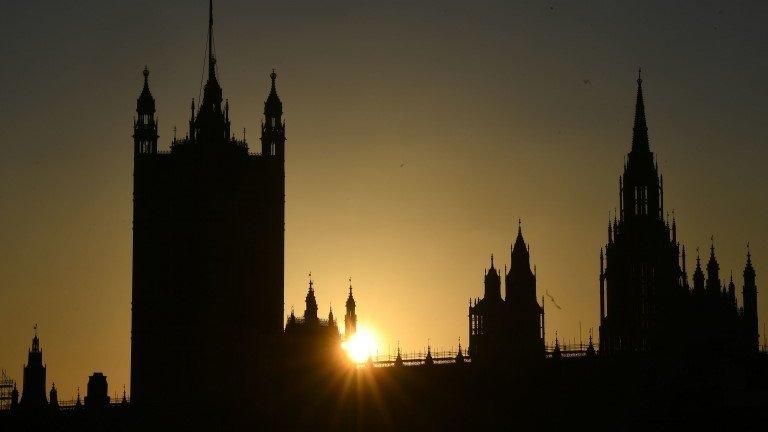
It's quiet, too quiet.
On one level Parliament seems pretty serene, especially in contrast to the rolling crisis in the months before the last election. Now there is a government which can expect to get its way in any Commons vote, and fears no backbench rebellion.
But wait. The prime minister may seem all-conquering, but he has just lost his chancellor, the classic sign of a government in trouble. And Sajid Javid's resignation statement positioned the ex-chancellor as the champion of low taxes and sound money, and in the process as a lurking long term rival on the backbenches.
The tensions behind Mr Javid's departure will out at the Budget in a couple of weeks. Will the new Chancellor Rishi Sunak shrug off inconvenient fiscal rules to reward new Conservative voters in the North? Will promised tax cuts go ahead? Or will it be a "jam tomorrow" budget, of promises postponed and expectations deferred?
So even before we get to Brexit, there are serious tensions for the government to manage, although it remains to be seen if the opposition is deft enough to exploit them.
And while Brexit remains the dominant issue in politics, post-election discussion of it in the Commons, has been curiously low-key, especially when you remember that, just months ago, there were endless convulsions over efforts to rule out a no-deal exit from the EU, and it remains distinctly possible that the UK could indeed exit single market at the end of the year without a replacement trade agreement.
The government's election victory has silenced its critics, for now, not least because most of the hardcore Tory rebels lost their seats, and they were the ones offering the most trenchant criticism.
Foot-dragging?
After a long interlude, the select committees are about to be formed. The motions naming the ordinary members of the committees are down on the Order Paper for Monday, which means the committees should be able to hold meetings to start agreeing what they want to look at and who they want to talk to.
First out of the traps will be the Public Accounts Committee, the powerful and hard-working financial watchdog, which will be holding its first evidence session, on the evergreen topic of HS2, on Wednesday afternoon - other committees might be fleet-footed and enterprising enough to hold hearings the following week, while the Backbench Business Committee and the Petitions Committee can begin scheduling debates.
It's worth noting that the committees have not been in action since October 2019, so there's been no detailed scrutiny of government for upwards of four months. In 2015 the gap between the State Opening of Parliament and the first committee session was 25 sitting days, and in 2017 it was 20 days; this time it was 28 days. (Hat tip to BBC research guru Daniel Kraemer).
That has led to complaints of ministerial foot-dragging, with Labour MPs pointing out that they settled their committee members three weeks ago.
There's an amusing story that the Committee of Selection, which names MPs to committees, was so irritated by the delay that there were threats of strike action. If the motions were not put down they were going to start dragging their feet on naming the members of the committees which consider government legislation, striking back at ministers by slowing down the progress of their bills.
The system is now juddering into life, and doubtless there will be calls for such delays to be avoided in future. But there were similar calls, answered by solemn assurances, in 2015 and 2017, so expect the whole non-drama to be re-enacted after the next election, too.
One interesting phenomenon, in the run-up to International Women's Day on Sunday 8 March, is a fusillade of presentation bills from Lib Dem MPs on women's issues, including banning demonstrations close to abortion clinics and making community sentences the default for women offenders.
Presentation bills can be put down by any MP, but do not have any debating time attached to them, so they simply go to the back of the queue for discussion on the Friday sittings reserved for Private Members Bills, and are never seen again. It is a way of putting down a marker, and maybe, given that seven of the 11 Lib Dems in the Commons are women, it is a sign of their party adjusting its political priorities.
Here's my rundown of the week ahead:
Monday 2 March
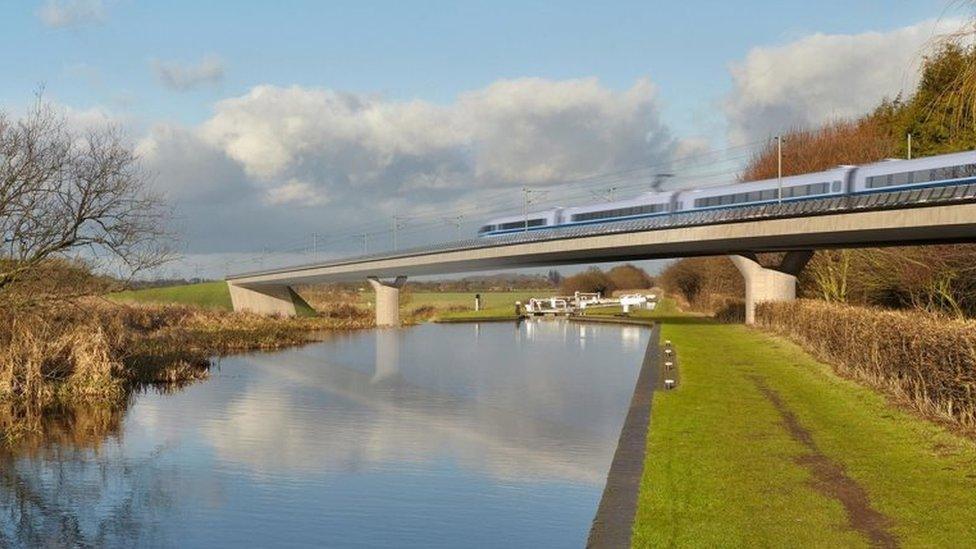
Will it happen? HS2 always raises passions at Westminster
The Commons opens (14:30) with education questions - which may see a debut from new Children and Families Minister Vicky Ford. The usual post-weekend crop of ministerial statements and urgent questions can be expected at 15:30, probably including an urgent question on the future of Heathrow expansion, after the Appeal Court ruling against the third runway. One factor to watch will be whether the MPs in alternative areas for airport expansion - Gatwick, Stansted - get their act together. Then Layla Moran presents the first of those Lib Dem presentation bills, on pupil access to toilets during lessons at state-funded schools.
The main debate will be on the second reading of the Medicines and Medical Devices Bill which gives minister regulation-making powers covering human medicines, clinical trials and medical devices. The aim is to allow existing regulations to be updated, post-Brexit.
The day's most controversial moment will probably be the motion to bring back the bill to authorise the next stage of the HS2 high-speed rail line. The bill for the section running from Birmingham to Crewe fell at the general election, but can be revived under a "Lazarus motion" proposed by Transport Secretary Grant Shapps, and treated as having reached the stage of parliamentary consideration it was at, when the music stopped.
No HS2 debate is complete without opposition from MPs along the route, so keep an eye out for the likes of Michael Fabricant, Cheryl Gillan and Sir Bill Cash. He will be arguing that since the government has launched a review of the later stages of the HS2 project, the sections running to Manchester and Leeds, this section should also be "paused" and included in the review process. Unless the government agrees, this vote looks set fair to produce the first Conservative backbench rebellion of the new parliament, although with Labour backing the motion, the government is in no danger of defeat.
After that MPs will be asked to approve all remaining estimates for spending by government departments - a chance to thrill to the sight of truly humungous sums of taxpayers money being allocated to government departments with pretty minimal parliamentary scrutiny. In the last parliament, a deal was done which allowed the Backbench Business Committee to select particular estimates for debate, but because BBBCom is not in operation, yet, there won't be a chance for that kind of selective examination of particular budgets that MPs thought important. Maybe next time.
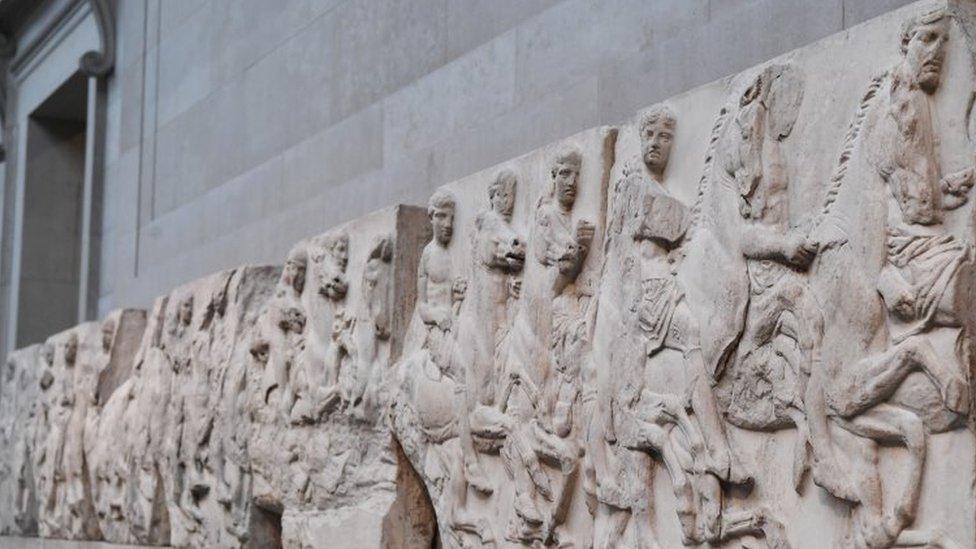
Will the Elgin Marbles be returning to Greece?
The day ends with an adjournment debate led by the SNP's Margaret Ferrier on the return of the Elgin marbles, AKA the Parthenon Marbles. In 2016 she co-signed a cross-party bill to return the sculptures to Greece, righting what the bill's backers described as "a 200-year-old wrong".
In the Lords (14:30) questions to ministers include former health minister Lord Hunt of Kings Heath asking whether the UK Magnitsky-style sanctions regime for human rights violations will apply to persons engaged in illegal organ trafficking or obtaining organs for transplant without consent. His question is based on a report from the WOIPFG (the World Organisation to Investigate the Persecution of Falun Gong) showing that more than 7,000 medical professionals in China are involved in illegal enforced organ-harvesting trade and it is believed that thousands of Falun Gong prisoners of conscience have been killed so their organs could be used in the lucrative market for transplants in China.
The final judgement of the China Tribunal chaired by Sir Geoffrey Nice QC concluded that force organ harvesting has been committed for years throughout China on a significant scale. He wants the government to assure peers that the sanctions regime (which includes a travel ban and asset-freezing) could be applied to these doctors.
Then, peers launch into detailed committee stage consideration of the Fisheries Bill, which will extend the UK's territorial fishing rights from 12 nautical miles to an Exclusive Economic Zone of 200 - and create a licensing system for UK and foreign vessels to fish in those waters based around a series of sustainability, scientific and economic criteria.
At this stage votes are unusual, and the purpose of amendments is to "probe" the government's intentions and the meaning of the provisions in the bill. But Labour will be arguing for fishing quotas to be switched away from wealthy families who dominate ownership towards smaller operations. They will also be pushing for use of compulsory surveillance technology to enforce fishing limits, and punish deliberate overfishing.
Finally, there will be a short debate on the impact of treatment by unregulated and unregistered people offering psychotherapy or counselling services, on the mental health and wellbeing of their clients, led by Lib Dem Baroness Jolly.
Tuesday 3 March
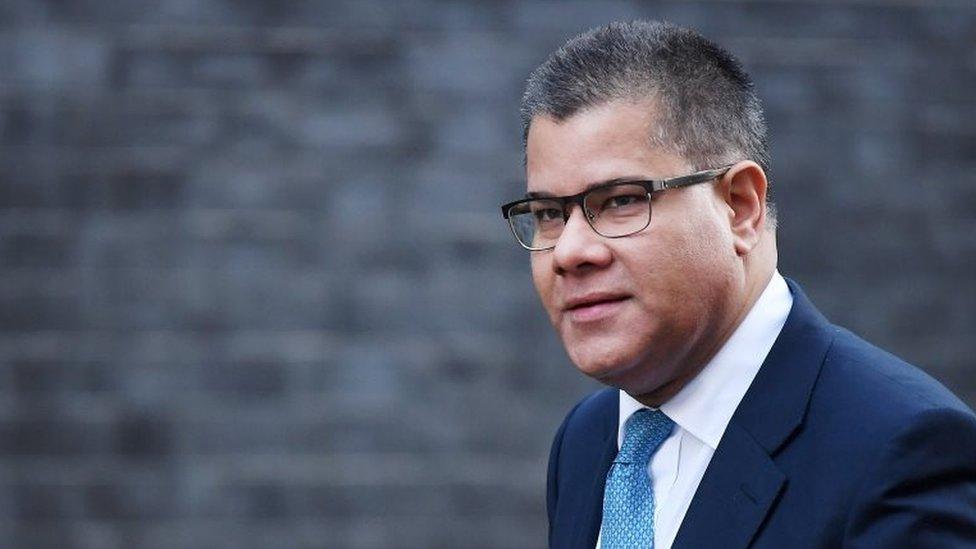
Alok Sharma's awaiting his big day
The commons day begins (11:30) with the first cabinet minister debut since the government reshuffle, with Alok Sharma at the Dispatch Box as business secretary.
Lib Dem Daisy Cooper presents a bill requiring the courts to impose community sentences on women offenders unless they have committed a serious or violent crime, or are a danger to the public. That happens without debate, but Conservative Sir Christopher Chope will have to argue for his Ten Minute Rule Bill on Rule of Law (Enforcement by Public Authorities).
That's followed by some spending legislation, the Supply and Appropriation (Anticipation and Adjustments) Bill, and after that, the House will polish off the Prisoners (Disclosure of Information about Victims) Bill: Committee and Remaining Stages.
The day ends with an adjournment debate led by South Cambridgeshire's Conservative MP Anthony Browne, on the police response to climate protests in Cambridge. He has criticised the decision to close two roads blocked by protesters, saying: "However well intentioned, demonstrators cannot be allowed to flagrantly break the law."
In Westminster Hall (09:30) there's a debate on the nursing workforce shortage in England, led by Labour's Mohammad Yasin. He will point to 40,000 vacancies in substantive nursing posts especially in mental health, learning disability, primary and community nursing, and warn that in the event of a no-deal Brexit, the NHS staffing crisis will intensify.
Former Downing Street staffer Neil O'Brien has a debate on housing and planning (14:30). Among other things he will float is the idea of creating some kind of bond or fixed-penalty-notice system to make it much easier for councils to fine developers who break planning conditions, for example, failing to provide promised infrastructure.
And with the Domestic Abuse Bill, which fell as a result of the snap election, due to be brought back to Parliament soon, Labour's Liz Twist leads a debate on the impact on children of domestic abuse. (16:30)
In the Lords (14:30) questions cover the costs of clinical negligence, local and regional arts and cultural services and radicalisation in prisons.
There's a quick rubber-stamping exercise with the third reading of a Law Commission Bill, the Sentencing (Pre-consolidation Amendments) Bill, which makes a series of uncontroversial technical changes to criminal law around the introduction of the new sentencing code, and then peers move on to the detail of the Divorce, Dissolution and Separation Bill, which aims to simplify the law on ending a marriage, so the process is not unnecessarily antagonistic.
Finally, peers consider a series of orders on benefit uprating, covering Tax Credits, Employment Allowance, Child Benefit and Guardian's Allowance.
Wednesday 4 March
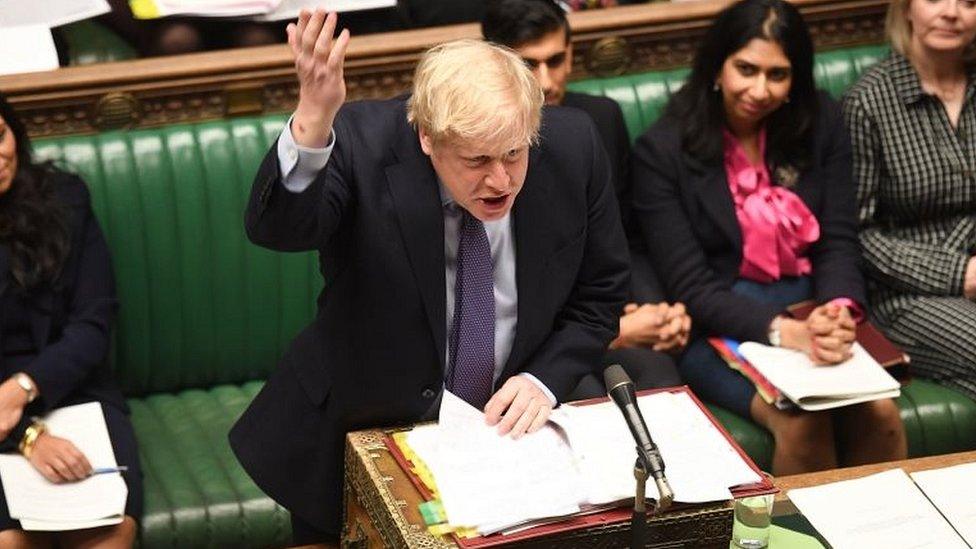
There's another cabinet debut as the Commons opens (11:30) with new secretary of state Anne-Marie Trevelyan at the Dispatch Box for half an hour of International Development Questions. At 12:00 Boris Johnson faces PMQs, which now seems to have been reliably restored to its traditional half-hour duration under the gimlet-eyed supervision of Mr Speaker Hoyle.
Lib Dem Wendy Chamberlain presents a bill requiring the international development secretary to report on the use of UK overseas aid to increase the availability of women's sanitary products. That is followed by a Ten Minute Rule Bill, this time from Conservative Peter Bone, to create a bank holiday to commemorate the Brexit referendum.
It will be an interesting morning in Westminster Hall, starting with what promises to be something of a pile-on (09:30) as former Conservative leader Sir Iain Duncan Smith leads a debate on the security implications of including components manufactured by the Chinese telecoms firm, Huawei, in the UK's 5G internet infrastructure.
There's a great deal of disquiet across Parliament on this issue - and the potential risks to security from allowing a company controlled by the Chinese government access to critical UK infrastructure, although the government believes the risks can be managed.
Watch out for contributions from heavyweight ex-ministers and select committee grandees like Tom Tugendhat and Tobias Ellwood. It could be a pretty awkward outing for whoever from the Department for Digital, Culture, Media and Sport ministerial team is sent to bat for the government.
That's followed by another significant debate (11:00) as former sports minister Tracey Crouch calls for an extension of the position of trust legislation to cover abuse perpetrated by sports coaches. This was a policy she proposed as a minister, but which, she says, "got stuck" in the Ministry of Justice. She wants to hear what the MoJ plans to do to close the loophole, and when.
As noted above, the first green shoots of select committee activity will appear, in the form of a PAC hearing on HS2, based on this National Audit Office report,, external which found that phase one is now forecast to cost between £31bn and £40bn, £3.9bn to £12.9bn (14% to 47%) more than its available funding.
In the Lords (15:00) questions to ministers range through doctor retention in the NHS, regulating genome-edited crops and management of investigations into historic sexual offences - this last is from Labour's Lord Campbell-Savours, a critic of the conduct of such inquiries.
Peers then put the finishing touches to the Birmingham Commonwealth Games Bill , which creates the legal framework for the 2022 Games, with what will probably be a brief third reading debate. Then they move on to their second day of detailed committee stage scrutiny of the Fisheries Bill.
There will also be a short debate on the problems and possible solutions for children in the school system with dyslexia and other neurodiverse conditions.
Thursday 5 March
International Trade Secretary Liz Truss survived the reshuffle and regular predictions of her sacking. She takes questions in the Commons (09:30), after which the Lib Dem Christine Jardine presents her bill to ban the differential pricing of similar products marketed to men and women.
Commons Leader Jacob Rees-Mogg takes questions on forthcoming Commons business, and then MPs move on to the annual debate on International Women's Day.
In the Lords (11:00) questions to ministers cover the effectiveness of the Crown Prosecution Service in prosecuting rape, health outcomes for lesbian, bisexual and trans women, and compensation for sub-postmasters as a result of the Horizon accounting system litigation, as compared to the losses they incurred due to Post Office Ltd's policies.
The main debate is on the role of the BBC and public service broadcasting to the UK's economy and creative culture - led by the Labour's Lord Young of Norwood Green.
And there is also a short debate on educational opportunities available to children and young people from working-class backgrounds - led by the Labour former Education Secretary Baroness Morris of Yardley.
Friday 6 March
Neither House sits.
- Published6 February 2020

- Published27 January 2020
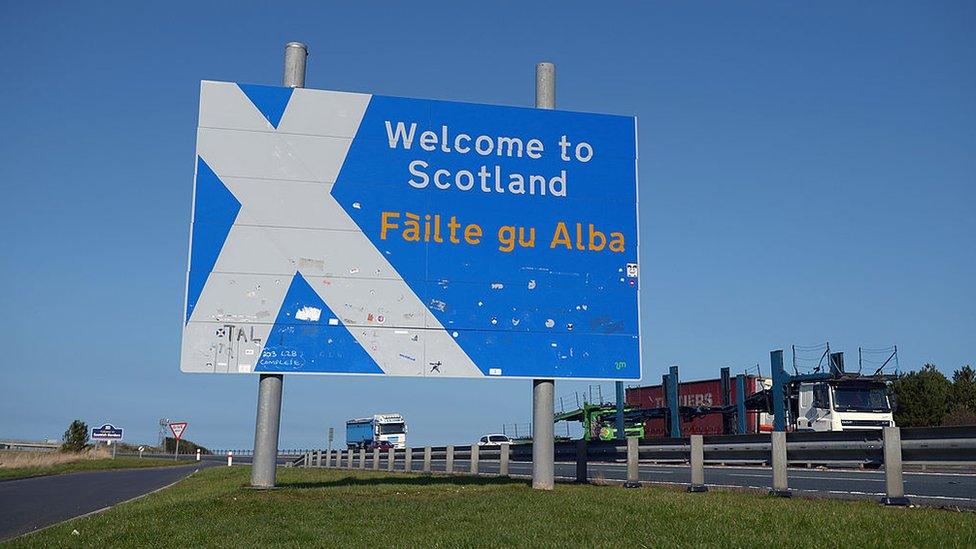
- Published29 January 2020

